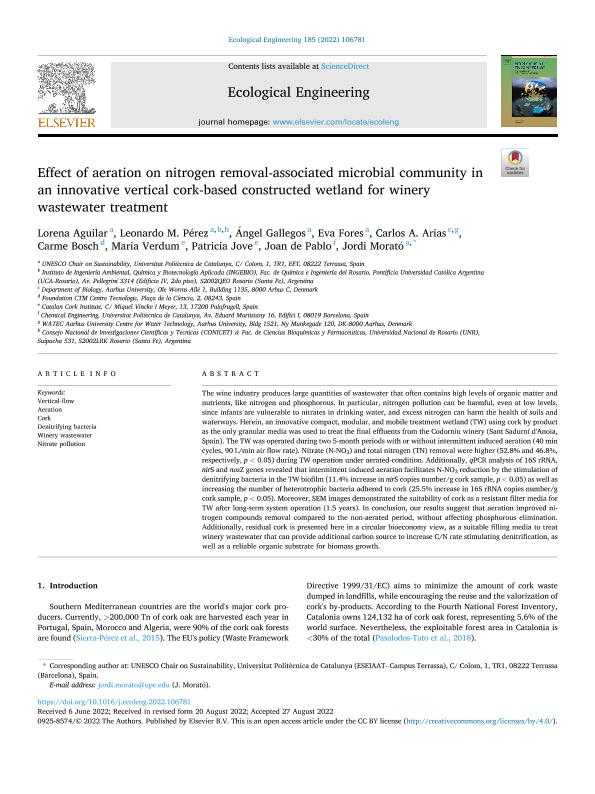Mostrar el registro sencillo del ítem
dc.contributor.author
Aguilar, Lorena
dc.contributor.author
Perez, Leonardo Martin

dc.contributor.author
Gallegos, Ángel
dc.contributor.author
Fores, Eva
dc.contributor.author
Arias, Carlos A.
dc.contributor.author
Bosch, Carme
dc.contributor.author
Verdum, Maria
dc.contributor.author
Jove, Patricia
dc.contributor.author
de Pablo, Joan
dc.contributor.author
Morató, Jordi
dc.date.available
2023-11-10T14:19:27Z
dc.date.issued
2022-12
dc.identifier.citation
Aguilar, Lorena; Perez, Leonardo Martin; Gallegos, Ángel; Fores, Eva; Arias, Carlos A.; et al.; Effect of aeration on nitrogen removal-associated microbial community in an innovative vertical cork-based constructed wetland for winery wastewater treatment; Elsevier Science; Ecological Engineering; 185; 12-2022; 1-7
dc.identifier.issn
0925-8574
dc.identifier.uri
http://hdl.handle.net/11336/217754
dc.description.abstract
The wine industry produces large quantities of wastewater that often contains high levels of organic matter and nutrients, like nitrogen and phosphorous. In particular, nitrogen pollution can be harmful, even at low levels, since infants are vulnerable to nitrates in drinking water, and excess nitrogen can harm the health of soils and waterways. Herein, an innovative compact, modular, and mobile treatment wetland (TW) using cork by product as the only granular media was used to treat the final effluents from the Codorniu winery (Sant Sadurní d'Anoia, Spain). The TW was operated during two 5-month periods with or without intermittent induced aeration (40 min cycles, 90 L/min air flow rate). Nitrate (N-NO3) and total nitrogen (TN) removal were higher (52.8% and 46.8%, respectively, p < 0.05) during TW operation under aerated-condition. Additionally, qPCR analysis of 16S rRNA, nirS and nosZ genes revealed that intermittent induced aeration facilitates N-NO3 reduction by the stimulation of denitrifying bacteria in the TW biofilm (11.4% increase in nirS copies number/g cork sample, p < 0.05) as well as increasing the number of heterotrophic bacteria adhered to cork (25.5% increase in 16S rRNA copies number/g cork sample, p < 0.05). Moreover, SEM images demonstrated the suitability of cork as a resistant filter media for TW after long-term system operation (1.5 years). In conclusion, our results suggest that aeration improved nitrogen compounds removal compared to the non-aerated period, without affecting phosphorous elimination. Additionally, residual cork is presented here in a circular bioeconomy view, as a suitable filling media to treat winery wastewater that can provide additional carbon source to increase C/N rate stimulating denitrification, as well as a reliable organic substrate for biomass growth.
dc.format
application/pdf
dc.language.iso
eng
dc.publisher
Elsevier Science

dc.rights
info:eu-repo/semantics/openAccess
dc.rights.uri
https://creativecommons.org/licenses/by/2.5/ar/
dc.subject
AERATION
dc.subject
CORK
dc.subject
DENITRIFYING BACTERIA
dc.subject
NITRATE POLLUTION
dc.subject
VERTICAL-FLOW
dc.subject
WINERY WASTEWATER
dc.subject.classification
Biotecnología Medioambiental

dc.subject.classification
Biotecnología del Medio Ambiente

dc.subject.classification
INGENIERÍAS Y TECNOLOGÍAS

dc.title
Effect of aeration on nitrogen removal-associated microbial community in an innovative vertical cork-based constructed wetland for winery wastewater treatment
dc.type
info:eu-repo/semantics/article
dc.type
info:ar-repo/semantics/artículo
dc.type
info:eu-repo/semantics/publishedVersion
dc.date.updated
2023-11-09T14:19:10Z
dc.journal.volume
185
dc.journal.pagination
1-7
dc.journal.pais
Países Bajos

dc.journal.ciudad
Amsterdam
dc.description.fil
Fil: Aguilar, Lorena. Universidad Politécnica de Catalunya; España
dc.description.fil
Fil: Perez, Leonardo Martin. Universidad Nacional de Rosario. Facultad de Ciencias Bioquímicas y Farmacéuticas; Argentina. Pontificia Universidad Católica Argentina "Santa María de los Buenos Aires". Facultad de Química e Ingeniería-Rosario; Argentina. Consejo Nacional de Investigaciones Científicas y Técnicas. Centro Científico Tecnológico Conicet - Rosario; Argentina
dc.description.fil
Fil: Gallegos, Ángel. Universidad Politécnica de Catalunya; España
dc.description.fil
Fil: Fores, Eva. Universidad Politécnica de Catalunya; España
dc.description.fil
Fil: Arias, Carlos A.. Aarhus University. Aarhus Institute Of Advanced Studies.; Dinamarca
dc.description.fil
Fil: Bosch, Carme. No especifíca;
dc.description.fil
Fil: Verdum, Maria. No especifíca;
dc.description.fil
Fil: Jove, Patricia. No especifíca;
dc.description.fil
Fil: de Pablo, Joan. Universidad Politécnica de Catalunya; España
dc.description.fil
Fil: Morató, Jordi. Universidad Politécnica de Catalunya; España
dc.journal.title
Ecological Engineering

dc.relation.alternativeid
info:eu-repo/semantics/altIdentifier/url/https://linkinghub.elsevier.com/retrieve/pii/S0925857422002427
dc.relation.alternativeid
info:eu-repo/semantics/altIdentifier/doi/http://dx.doi.org/10.1016/j.ecoleng.2022.106781
Archivos asociados
